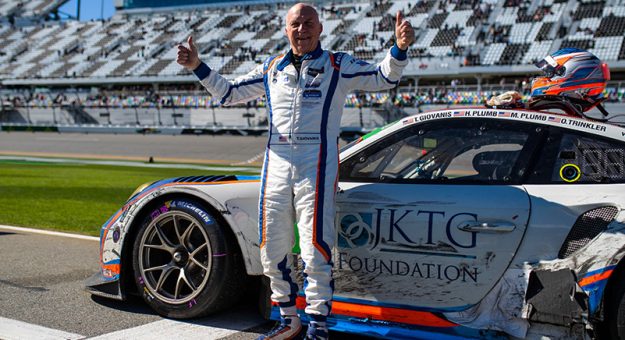The Giovanis Institute at Johns Hopkins Medicine Will Pursue Breakthroughs in Ways to Prevent Cancer from Spreading in the Body
By Mark Robinson
DAYTONA BEACH, Fla. – Ted Giovanis has carved his path through life by going against the odds. Whether it’s been beating the federal government in a court case involving Medicare reimbursements or being a competitive IMSA Michelin Pilot Challenge team owner/driver at age 77.
Now, Giovanis is taking that same approach after recently announcing a $35 million donation to create the Giovanis Institute for Translational Cell Biology at Johns Hopkins Medicine. Through the gift, scientists will study how cancer metastasizes, or spreads through the body, in the hope of discovering commonalities in the ways different cancers spread and leading to new therapies that may limit or prevent metastasizing in a patient’s body altogether.
The generous donation, a 15-year commitment, comes from the Jayne Koskinas Ted Giovanis Foundation for Health and Policy, named in honor of Giovanis’ wife who died from metastatic breast cancer in 2010.
“I think of myself as someone who wants to make a difference, and I can leverage the work of my foundation to a much broader and more impactful scale by providing this gift to Johns Hopkins,” Giovanis said when the donation was announced on May 10.
Giovanis stressed in a follow-up interview that he wants to change how medical research is done in the United States. Too much research, he says, focuses on confirming hypotheses that are likely to be proven before the research begins. What Giovanis wants through the Giovanis Institute is to encourage research without guarantees of success. The path to innovative treatments may lie outside the realm of traditional research thinking. At the least, undertaking unconventional research projects could help rule out a path to take.
“Like in racing, sometimes you try stuff and not know if it’s going to work until you do it,” Giovanis said, drawing the parallel to what he sees with Team TGM at the racetrack. “You may make wing or air pressure adjustments and see what happens. We can accept that what we just threw on the car may not work.
“Knowing what not to do is just as important as knowing what to do,” he adds. “In research, (most) only invest in things that they know are going to work out. That leaves a lot of exploration where interest might lie, and that’s the space that we play in. … That’s what’s potentially transformative about this. It will lead to better findings.”
Giovanis said he opted to partner with Johns Hopkins because of the vision of Dr. Andrew Ewald, director of the Department of Cell Biology at the Johns Hopkins University School of Medicine who was named director of the Giovanis Institute. Ewald, Giovanis said, is just as passionate about exploring unique avenues of research with no assurances of successful outcomes.
The initial focus will be on how breast cancer metastasizes, but Giovanis said there are commonalities in the ways different cancers spread, so the research may benefit those other types as well.
“If you look at the cancer cell as a seed, it’s looking for someplace to go (when it spreads),” Giovanis explains. “If we can find out what it’s looking for, maybe we can test for that. … If we can know how it operates, we believe there will be ideas that emerge on how we can disrupt that – how it metastasizes and lands someplace.”
Using another racing analogy, Giovanis considers the JKTG Foundation’s donation to create the Giovanis Institute like the fuel that goes into the car. From there, it’s up to the crew, engineers and drivers to take it across the finish line.
“We’re trying to make a difference,” he says. “I’ve been pretty fortunate in life so this is a way to give back, but I’m not going to be the one to make a difference. It’s Andy Ewald and all those people, it’s that team.”
Photo credit: Team TGM
